 We've got a bit of a roller coaster today between good news and terrible news on today's BradCast. But that's life in the times of Trump and the coronavirus, I guess. [Audio link to full show is posted below.]
We've got a bit of a roller coaster today between good news and terrible news on today's BradCast. But that's life in the times of Trump and the coronavirus, I guess. [Audio link to full show is posted below.]
First up today, the COVID-19 crisis continues to gravely worsen in the U.S., with new record infections and hospitalizations now pretty much every day for the past month. Despite the increasingly desperate concerns expressed by health experts, especially for hotspots where Governors reopened states far too early, some Republicans from the President of the United States on down are calling for measures that will only increase infection rates, hospitalizations and, yes, death.
Florida's Education Commissioner Richard Corcoran on Monday, for example, declared that all public schools must reopen next month to all students for in-person classes five days a week. His emergency order notes that reopening schools is critical to "a return to Florida hitting its full economic stride". That, despite more than 200,000 confirmed cases and new record daily infection rates each day for weeks now in the Sunshine State.
At the same time, in Washington D.C. on Tuesday, Donald Trump held a White House event to demand the reopening of schools and to praise Florida's Governor Ron DeSantis for a "terrific job" in ordering them to open. Trump claimed that schools have been closed elsewhere for "political reasons" and added that "we are very much going to put pressure on Governors and everybody else to open the schools." This is now a death march being led by the President of the United States.
But if Republican politicians are fine sending children and their teachers and their families to their potential deaths, how do you think federal judges appointed by Trump or sympathetic to his political cause are going to react to measures being taken to try and make voting safer for Americans on November 3rd? We're joined again today by Slate's ace legal reporter MARK JOSEPH STERN to discuss Monday's opinions released by the U.S. Supreme Court, as well as a disturbing pattern of rulings at both SCOTUS and on the appellate level over the past two weeks that bodes darkly for this year's crucial Presidential election.
First, Monday's new opinions: The Court decided unanimously that states may prevent so-called "faithless electors" from casting their vote in the Electoral College for someone other than the Presidential candidate chosen by the state's popular vote. The issue stemmed from two combined cases of "faithless electors" in 2016, one of which was brought by plaintiff Michael Baca against Colorado. Baca appeared on The BradCast in December of 2016 to explain the reasons for his planned "faithless" vote in the Electoral College that year, before he was later prevented by the state from casting it.
While that opinion, written by Justice Elana Kagan received most of the media attention on Monday, another opinion handed down by the Court that day is likely of far greater import. The Court's 6 to 3 decision, with Justice Brett Kavanaugh writing for the majority in a case concerning robocalls made to cell phones, actually reveals some very encouraging news regarding a challenge to the Affordable Care Act (ACA or Obamacare) that will be heard next session by the Court. Kavanaugh's opinion, striking down one element of a robocall law as unconstitutional while upholding the rest of the law, suggests the challenge to Obamacare by GOP-controlled states and the White House --- seeking to strike down the entire health care law as unconstitutional based on the constitutionality of one single, now meaningless, provision --- is likely to fail.
As Kavanaugh crucially noted in his opinion, in words that will be remembered next year during the ACA case: "Constitutional litigation is not a game of gotcha against Congress, where litigants can ride a discrete constitutional flaw in a statute to take down the whole, otherwise constitutional statute."
"It's important to note that seven justices agreed with [Kavanaugh] on that particular point," Stern tells me. "Only Thomas and Gorsuch disagreed."
And with that seemingly very good news out of the way, we turn to a flurry of recent decisions by both SCOTUS and a number of federal appeals courts that are extremely concerning and revealing as to how right-wing controlled federal courts will be dealing with voter suppression cases and measures intended to make voting easier during the pandemic this November. Recent court rulings in cases out of Florida, Wisconsin, Alabama and Texas, as Stern explains, are very troubling indeed and suggest we could be in for no small amount of chaos, disenfranchisement and, yes, deadly disease, in this year's critical general elections.
There are more opinions to come from the Court before they are finished for the summer. Quips Stern darkly today: "We've got a handful left, and we will see if the Supreme Court breaks our democracy before the end of the term."
Finally, we close with Desi Doyen and our latest Green News Report, with a bit more news out of SCOTUS and lower federal courts, including some surprisingly very good news on several controversial oil and gas pipelines!...
(Snail mail support to "Brad Friedman, 7095 Hollywood Blvd., #594 Los Angeles, CA 90028" always welcome too!)
|


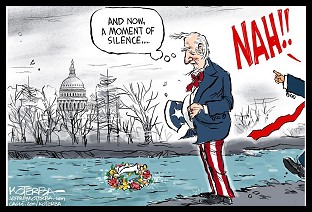 Sunday 'DEI (Divisive Erroneous Idiocracy)' Toons
Sunday 'DEI (Divisive Erroneous Idiocracy)' Toons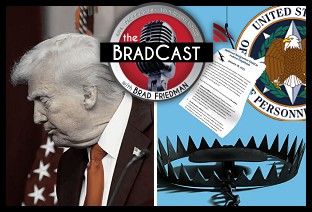 Trump/Musk Deferred Resignation Scheme an 'Unlawful, Barely Veiled Threat': 'BradCast' 1/30/25
Trump/Musk Deferred Resignation Scheme an 'Unlawful, Barely Veiled Threat': 'BradCast' 1/30/25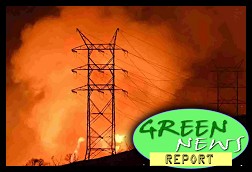 'Green News Report' 1/30/25
'Green News Report' 1/30/25
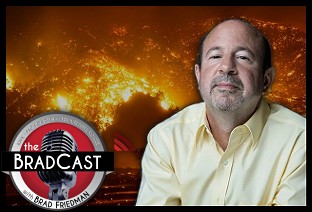 'They Know They're Lying': Fossil Fuel's War on Science, Humanity: 'BradCast' 1/29/25
'They Know They're Lying': Fossil Fuel's War on Science, Humanity: 'BradCast' 1/29/25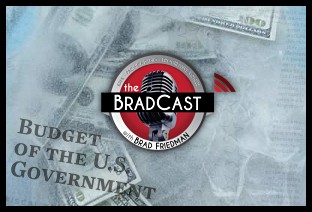 Trump Attempts to Usurp Congressional Budget Authority: 'BradCast' 1/28/25
Trump Attempts to Usurp Congressional Budget Authority: 'BradCast' 1/28/25 'Green News Report' 1/28/25
'Green News Report' 1/28/25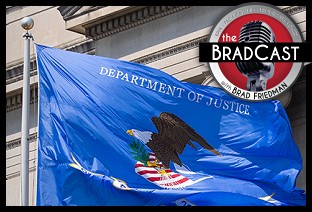 Trump Massacres Begin at DOJ, I.G. Offices: 'BradCast' 1/27/25
Trump Massacres Begin at DOJ, I.G. Offices: 'BradCast' 1/27/25 The BRAD BLOG is Now 21 and Over!
The BRAD BLOG is Now 21 and Over!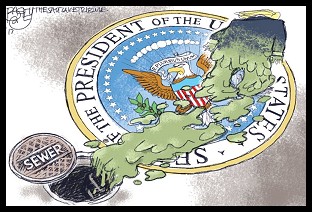 Sunday 'No Mercy' Toons
Sunday 'No Mercy' Toons 'Green News Report' 1/23/25
'Green News Report' 1/23/25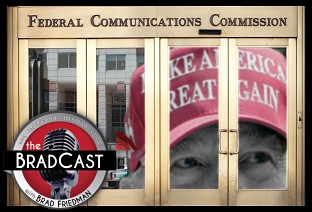 Trump Weaponizing FCC Against Free Press:
Trump Weaponizing FCC Against Free Press: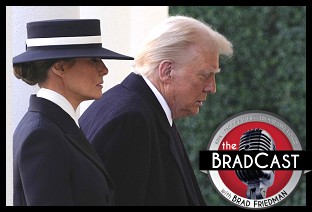 'Drooling Thunder': Trump Still Sucks at Presidenting: 'BradCast' 1/22/25
'Drooling Thunder': Trump Still Sucks at Presidenting: 'BradCast' 1/22/25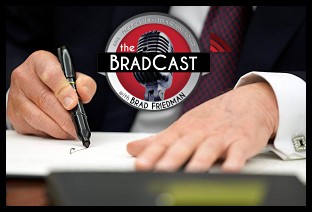 Trump's Day 1 Assault on America: 'BradCast' 1/21/25
Trump's Day 1 Assault on America: 'BradCast' 1/21/25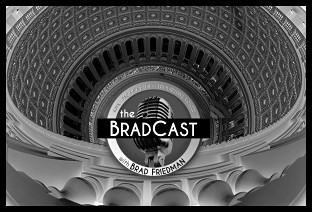 2025 Inauguration Counter-Programming Special: 'BradCast' 1/20/25
2025 Inauguration Counter-Programming Special: 'BradCast' 1/20/25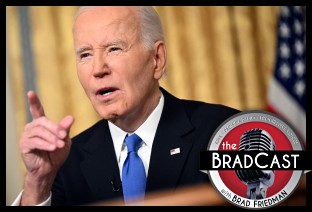 Fires, Liars and Oligarchs Rising Warns Biden in Final Bow: 'BradCast' 1/16/25
Fires, Liars and Oligarchs Rising Warns Biden in Final Bow: 'BradCast' 1/16/25 Does Trump's Sentencing as a Felon Matter?: 'BradCast' 1/15/25
Does Trump's Sentencing as a Felon Matter?: 'BradCast' 1/15/25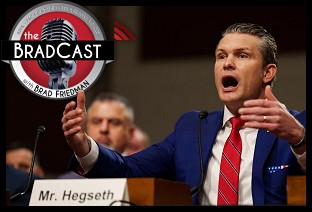 Hegseth Faces Dem Fire in Senate SecDef Nom Hearing: 'BradCast' 1/14/25
Hegseth Faces Dem Fire in Senate SecDef Nom Hearing: 'BradCast' 1/14/25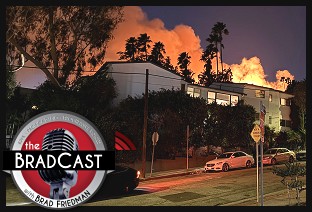 Ordered to Evacuate, But Now Home Safe: 'BradCast' 1/9/25
Ordered to Evacuate, But Now Home Safe: 'BradCast' 1/9/25
 VA GOP VOTER REG FRAUDSTER OFF HOOK
VA GOP VOTER REG FRAUDSTER OFF HOOK Criminal GOP Voter Registration Fraud Probe Expanding in VA
Criminal GOP Voter Registration Fraud Probe Expanding in VA DOJ PROBE SOUGHT AFTER VA ARREST
DOJ PROBE SOUGHT AFTER VA ARREST Arrest in VA: GOP Voter Reg Scandal Widens
Arrest in VA: GOP Voter Reg Scandal Widens ALL TOGETHER: ROVE, SPROUL, KOCHS, RNC
ALL TOGETHER: ROVE, SPROUL, KOCHS, RNC LATimes: RNC's 'Fired' Sproul Working for Repubs in 'as Many as 30 States'
LATimes: RNC's 'Fired' Sproul Working for Repubs in 'as Many as 30 States' 'Fired' Sproul Group 'Cloned', Still Working for Republicans in At Least 10 States
'Fired' Sproul Group 'Cloned', Still Working for Republicans in At Least 10 States FINALLY: FOX ON GOP REG FRAUD SCANDAL
FINALLY: FOX ON GOP REG FRAUD SCANDAL COLORADO FOLLOWS FLORIDA WITH GOP CRIMINAL INVESTIGATION
COLORADO FOLLOWS FLORIDA WITH GOP CRIMINAL INVESTIGATION CRIMINAL PROBE LAUNCHED INTO GOP VOTER REGISTRATION FRAUD SCANDAL IN FL
CRIMINAL PROBE LAUNCHED INTO GOP VOTER REGISTRATION FRAUD SCANDAL IN FL Brad Breaks PA Photo ID & GOP Registration Fraud Scandal News on Hartmann TV
Brad Breaks PA Photo ID & GOP Registration Fraud Scandal News on Hartmann TV  CAUGHT ON TAPE: COORDINATED NATIONWIDE GOP VOTER REG SCAM
CAUGHT ON TAPE: COORDINATED NATIONWIDE GOP VOTER REG SCAM CRIMINAL ELECTION FRAUD COMPLAINT FILED AGAINST GOP 'FRAUD' FIRM
CRIMINAL ELECTION FRAUD COMPLAINT FILED AGAINST GOP 'FRAUD' FIRM RICK SCOTT GETS ROLLED IN GOP REGISTRATION FRAUD SCANDAL
RICK SCOTT GETS ROLLED IN GOP REGISTRATION FRAUD SCANDAL VIDEO: Brad Breaks GOP Reg Fraud Scandal on Hartmann TV
VIDEO: Brad Breaks GOP Reg Fraud Scandal on Hartmann TV RNC FIRES NATIONAL VOTER REGISTRATION FIRM FOR FRAUD
RNC FIRES NATIONAL VOTER REGISTRATION FIRM FOR FRAUD EXCLUSIVE: Intvw w/ FL Official Who First Discovered GOP Reg Fraud
EXCLUSIVE: Intvw w/ FL Official Who First Discovered GOP Reg Fraud GOP REGISTRATION FRAUD FOUND IN FL
GOP REGISTRATION FRAUD FOUND IN FL


































